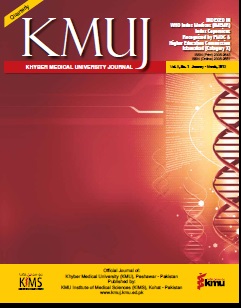FREQUENCY OF G6PD DEFICIENCY AND ITS SEVERITY IN NEONATAL JAUNDICE IN REHMAN MEDICAL INSTITUTE, PESHAWAR
Main Article Content
Abstract
Objective: To detect the frequency of glucose 6-phosphate dehydrogenase (G6PD) and its association with neonatal jaundice.
Methodology: This hospital based comparative study was conducted on neonatesadmitted for neonatal jaundice at Rehman Medical Institute Peshawar, Pakistan from 1st Jan, 2006 to 1 June, 2012. A total of 4900 patients were admittedduring this time period, of which 1695 (34.6%) neonates were treated for neonatal Jaundice. Estimation of serum bilirubin (both direct and indirect) was done in all cases and G6PD was done in cases with severe jaundice or with any absolute indication.
Results: Out of the total 1695 patients admitted for neonatal jaundice, 152(9%) babies were found to be G6PD deficient. Majority of the patients presented with jaundice in the first 4 days of life. G6PD was found to be the most severe form of jaundice with 56% out all exchange transfused neonates were having no other risk factor but G6PD deficiency. ABO (31.97%) and sepsis (30%) were the common causes of neonatal jaundice.
Conclusion: G6PD is one of the common causes of neonatal jaundice. Babies with G6PD can present earlier and can have serious consequences.
Article Details
Work published in KMUJ is licensed under a
Creative Commons Attribution 4.0 License
Authors are permitted and encouraged to post their work online (e.g., in institutional repositories or on their website) prior to and during the submission process, as it can lead to productive exchanges, as well as earlier and greater citation of published work.
(e.g., in institutional repositories or on their website) prior to and during the submission process, as it can lead to productive exchanges, as well as earlier and greater citation of published work.
References
Bhutani VK, Johnson L, sivieri EM. Predictive
ability of pre-discharge hour-specific
bilirubin for subsequent significant hyperbilirubinaemia in healthy term and near term newborns. Pediatrics 1999; 103: 6-14.
Stevenson DK, Fanaroff A, Maisels J, Young BW, Wong RJ, Vreman HJ, et al. Prediction of hyperbilirubinemia in term and near term newborn infants. Pediatrics 2001; 108: 31-9.
Dholakia A, Darad D, Chauhan S. Neonatal
hyperbilirubinemia and its correlation with G6PD enzyme deficiency in a tertiary care hospital in Gujarat. Nat J Med Res 2012(2): 59-62.
Beutler E. Hemolytic anemia in disorders of red cell metabolism. New York: Plenum Medical Book Company, 1978: 23-169.
Miller DR. Hemolytic anemia’s: metabolic disorders. In: Miller DR, Baehner RL, editors. Blood diseases of infancy and childhood. St. Louis: Mosby Year Book Inc., 1995: 354.
Behjati S, Nikkah A, Sedaghat M. The association between G6PD and total serum bilirubin level in icteric neonates Acta Medica Iranica 2007; 45(3): 233-5.
Prchal JT, Gregg XT. Red cell enzymopathies.
In: Hoffman R, Benz E, Eds. Hematology:
Basic Principles and Practice, 4th ed. Philadelphia: Churchill Living-stone 2005; pp 653-659.
Frank JE. Diagnosis and management of G6PD deficiency. Am Fam Physician 2005; 72: 1277-82.
Al-Ali AK, Al-Mustafa ZH, Al-Madan M, Qaw F, Al-Ateeq S. Molecular characterization
of glucose-6-phosphate dehydrogenase
deficiency in the Eastern Province of Saudi Arabia. Clin Chem Lab Med. 2002; 40(8): 814-6.
Al-Abdi SY, Mousa TA, Al-Aamri MA, Ul-Rahman NG, Abou-Mehrem AI. Hyperbilirubinemia
in glucose-6-phosphate dehydrogenase-deficient male newborns in Al-Ahsa, Saudi Arabia. Saudi Med J 2010; 31(2): 175-9.
Tripathy V, Reddy BM. Present status of understanding on the G6PD deficiency and natural selection. J Post-grad Med 2007; 53: 193-202.
Tay JS. Medical genetics in Singapore. Southeast Asian J Trop Med Public Health 1995; 26(1): 19-25.
Rehman H, Khan MA, Hameed A, Roghani MT, Ahmad A. Erythrocyte glucose 6 phosphate dehydrogenase deficiency and neonatal jaundice. J Pak Med Assoc 1995; 45(10): 259-60.
Khattak MF, Dawood MM, Saleem M. The prevalence of glucose 6 phosphate dehydrogenase deficiency in Northern Pakistan. Pak Armed Forces Med J 1992; 42: 35-8.
Saha N, Ramzan M, Tay JS, Low PS, Basair JB, Khan FM. Molecular characterization of red cell Glucose 6 Phosphate dehydrogenase
deficiency in north-west Pakistan. Hum Hered 1994; 44: 85-9.
Marx. Management of hyperbilirubinemia in the newborn infant 35 or more weeks of gestation. Pediatrics 2004; 114(1): 297-316.
Panizon F. Erythocyte enzyme deficiency in unexplained kernicterus. Lancet 1960; 2: 1093.
Al-Naama, LM, Al-Sadoon, IA, Al-Naama
MM. Neonatal jaundice and glucose-
-phosphate dehydrogenase deficiency
in Barash. Ann trop paediatr 1987; 7(2): 134-8.
Dawodu A, Qreshi MM, Moustafa IA, Bayoui RA. Epidemiology of clinical hyperbilirubinaemia in Al Ain, United Arab Emirates. Ann Trop Paediatr 1998; 18(2): 93-9.
FadilJawad, William MF. Molecular basis of G6PD deficiency in hyperbilirubinaemic neonates in Middle Euphrates Province: Irqa. Karbala J Med 2010; 3(4): 867-81.
Mohamed S. Newborn screening for glucose-6-phosphate dehydrogenase deficiency
in Eastern Province, Saudi Arabia. CurrPediatr Re 2012; 16(2): 125-8.
Alvi MY, Laeeq A, Khan MA, Iqbal MA. Glucose-6-Phosphate Dehydrogenase deficiency
associated with neonatal jaundice. Pak Paed J 2006; 30: 28-33.
Imran M, Rashid Akbar A. Neonatal jaundice
due to G6PD deficiency. Pak Paed J 1984; 8: 126-8.
Parveen A, Azra A, Ahmad KN. G6PD status and neonatal hyperbilirubinaemia. Pak Paed J 1986; 10: 241-4.
Khan A, Khawar N,. Neonatal hyperbilirubinaemia
secondary to erythrocyte gluose-
-Phophate dehydrogenase deificiency.
J Postgrad Med Inst 2002; 16: 33-38.
Khattak MI, Ishaq T, Subhan M, Afridi J. The frequency and age presentation of G6PD deficiency in 800 patients of hemolytic anemia. J Postgrad Med Inst 2006; 20: 170-3.
Hussain M, Irshad M, Kalim M, Ali L, Ali L. Glucose-6-Phosphate dehydrogenase deficiency
in jaundiced neonates. J Postgrad Med Inst 2010; 24(2): 122-126.
Rahim F, Zahid S, Mukhtiar S.A.S, Said H, Uzair M. Glucose-6-Phosphatase dehydrogenase
deficiency in neonates presenting with jaundice. J Postgrad Med Inst 2008; 22(2): 102-6.
Woodfield DG, Biddulph J. Neonatal jaundice
mutations and glucose-6-phosphate dehydrogenase deficiency in Papua New Guinea. Med J Aust 1975; 1: 443-6.
Dawodu AH, Owa JA, Familusi JB. A prospective study of the role of bacterial infection and G6PD deficiency in severe neonatal jaundice in Nigeria. Trop Geogr Med 1984; 36: 127-32.
